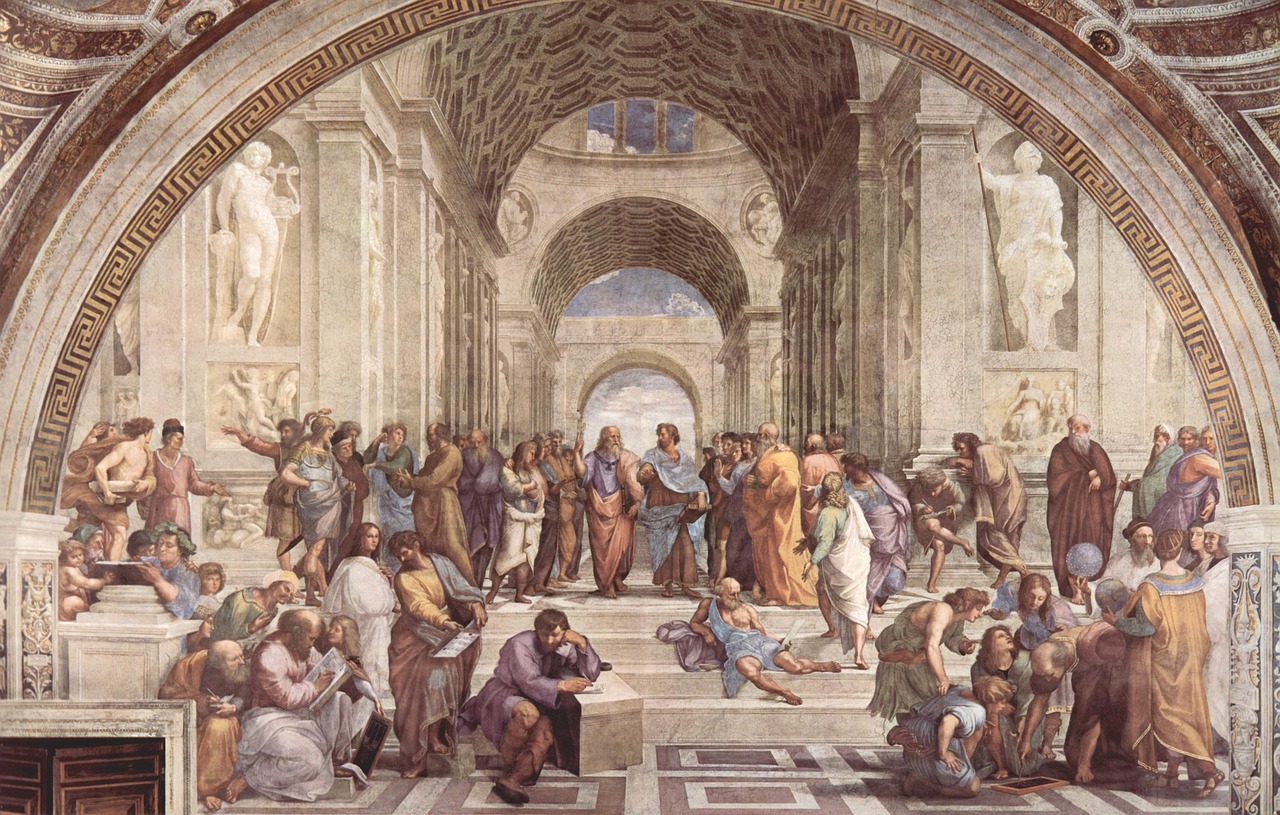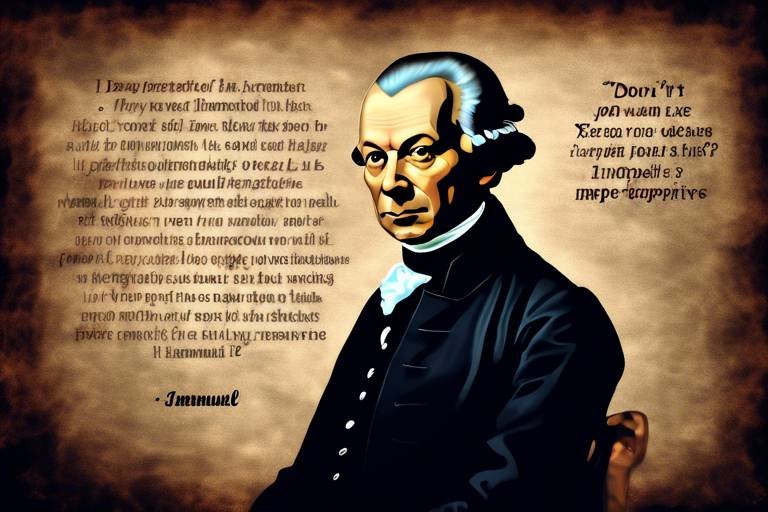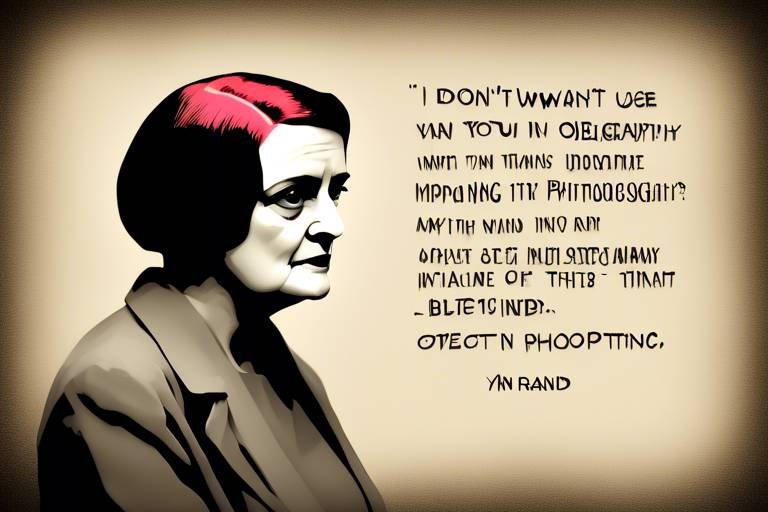An Examination of the Philosophical Innovations in Nietzsche's Thus Spoke Zarathustra
Friedrich Nietzsche's Thus Spoke Zarathustra is not just a book; it's a profound journey into the depths of human thought and experience. Published in the late 19th century, this work has sparked countless debates and interpretations, largely due to its rich tapestry of philosophical ideas. What makes this text so compelling? It's the way Nietzsche challenges us to rethink our values, our existence, and the very essence of what it means to be human. Through his poetic prose, he invites readers to step outside conventional boundaries and explore the revolutionary concepts that have shaped modern philosophy.
At the heart of Zarathustra lies the idea of the Übermensch, or Overman, a figure that embodies the pinnacle of human potential. Nietzsche uses this concept to urge individuals to transcend societal norms and moral limitations. Imagine, for a moment, a world where individuals are not shackled by outdated beliefs but are free to forge their own paths. This is the world Nietzsche envisions—a realm where the Übermensch represents the future of humanity, evolving beyond the constraints of current moralities.
Another pivotal theme in Nietzsche's work is the Will to Power, a concept that encapsulates the intrinsic drive within every human being to grow, dominate, and ultimately, overcome challenges. It's not merely about physical power; it's about the power to shape one's own destiny and influence the world. This notion can be likened to a river that carves its path through the landscape, persistent and unyielding. In this way, Nietzsche encourages us to embrace our desires and ambitions, viewing them as essential components of our existence.
The notion of Eternal Recurrence serves as a thought experiment that compels us to evaluate our lives deeply. Nietzsche challenges us to consider: what if we had to live our lives repeatedly, exactly as we have? This idea prompts a profound reflection on the choices we make and the values we uphold. Are we living authentically, or are we merely going through the motions? The weight of this concept forces us to confront our existence with urgency and intention.
In exploring the Role of Suffering, Nietzsche presents suffering as an inevitable aspect of life that fosters growth and transformation. Rather than shying away from pain, he encourages us to embrace it as a catalyst for self-improvement. Think of suffering as the blacksmith's fire, shaping raw metal into a finely crafted sword. This perspective invites readers to view their struggles not as burdens but as opportunities for evolution and strength.
Furthermore, Nietzsche's call for a Celebration of Life resonates deeply in a world often overshadowed by despair. He advocates for an affirmation of existence, urging individuals to seek joy, creativity, and personal fulfillment despite life's inherent challenges. In this light, life becomes a canvas, and we are the artists, free to paint our experiences with vibrant colors of passion and joy.
Nietzsche's critiques of traditional religion are another hallmark of Zarathustra. He argues for the necessity of creating personal values in a post-religious world, suggesting that the absence of a divine moral compass opens the door for individual exploration. In this context, values become subjective, shaped by personal experiences and perspectives. This shift invites us to take responsibility for our beliefs and actions, empowering us to forge our own paths.
When it comes to the Nature of Truth, Nietzsche challenges the conventional notion of an objective reality. He posits that our understanding of truth is inherently subjective, influenced by our unique perspectives. This idea can be likened to viewing a prism—each angle reveals a different hue, illustrating that our interpretations of reality are multifaceted and complex.
The Role of Art in Nietzsche's philosophy cannot be overstated. He views art as a vital expression of human experience, a medium through which we can explore and communicate the depths of our emotions and ideas. Art becomes a bridge connecting us to our innermost selves and to one another, allowing for a shared understanding of the human condition.
Lastly, Nietzsche emphasizes the importance of Individualism, advocating for self-discovery and authenticity as essential to achieving one's highest potential. In a world that often pressures conformity, Nietzsche's call to embrace individuality serves as a powerful reminder that our uniqueness is our greatest strength. He encourages us to break free from societal expectations and to pursue our true selves, fostering a sense of fulfillment and happiness that is deeply rooted in authenticity.
In summary, Nietzsche's Thus Spoke Zarathustra is a treasure trove of philosophical innovations that challenge us to rethink our existence, values, and the very nature of truth. By engaging with these concepts, we are invited to embark on a journey of self-discovery and transformation, ultimately leading us to a more profound understanding of what it means to be human.
- What is the main theme of Thus Spoke Zarathustra? The main theme revolves around the ideas of the Übermensch, the Will to Power, and the importance of individuality and self-creation.
- How does Nietzsche view suffering? Nietzsche views suffering as a necessary part of life that contributes to personal growth and transformation.
- What does Nietzsche mean by Eternal Recurrence? Eternal Recurrence is a thought experiment that asks individuals to consider how they would live their lives if they had to repeat them endlessly.
- Why is individualism important in Nietzsche's philosophy? Individualism is crucial as it encourages self-discovery and authenticity, allowing individuals to achieve their highest potential.

Thus Spoke Zarathustra,
This article explores the groundbreaking philosophical concepts introduced in Nietzsche's seminal work, Thus Spoke Zarathustra, highlighting key themes and their implications for modern thought.
Nietzsche introduces the idea of the Übermensch, or Overman, as a central figure representing human potential and the evolution of humanity beyond current moral constraints. The Übermensch embodies the ideal of self-overcoming, where individuals transcend societal norms and limitations. Imagine a person who not only strives for greatness but also defines what greatness means on their own terms. This concept challenges us to rethink our values and encourages a journey towards personal excellence.
The notion of the Will to Power serves as a driving force in Nietzsche's philosophy, emphasizing the fundamental human desire for growth, dominance, and self-overcoming. It’s not just about power in the political sense; it's about the power to shape one’s own life, to assert oneself in the world, and to pursue one's ambitions relentlessly. This idea compels us to ask ourselves: are we merely surviving, or are we actively crafting our destinies? The Will to Power encourages a proactive approach to life, urging us to harness our inner strength and creativity.
The concept of Eternal Recurrence challenges individuals to live their lives as if they would have to repeat them infinitely. Imagine waking up every day, knowing that you would relive the same day over and over again. Would you change your actions? This thought experiment prompts deep reflection on our choices and values, pushing us to evaluate what truly matters in our lives. It invites us to embrace our decisions with courage and authenticity, knowing that each moment is significant.
Suffering is depicted as an essential component of life that fosters growth and transformation. Nietzsche encourages readers to embrace challenges as opportunities for self-improvement. Just as a seed must break through the soil to grow into a strong tree, our struggles can lead to profound personal development. By reframing our perception of suffering, we can find strength in adversity and emerge more resilient than before.
Nietzsche advocates for a celebration of life, urging individuals to affirm their existence and pursue joy, creativity, and personal fulfillment despite life's inherent struggles. Life is not merely to be endured; it is to be embraced with passion and enthusiasm. He encourages us to dance through the chaos, to find beauty in the mundane, and to create meaning in our experiences. This celebration is a radical act of defiance against despair and nihilism.
Nietzsche's work critiques traditional religious beliefs, arguing for the necessity of creating personal values and meanings in a post-religious world. He famously declared that "God is dead," not as a literal statement but as an acknowledgment of the decline of traditional moral frameworks. In this new landscape, individuals must take on the responsibility of defining their own morals and beliefs, leading to a more authentic and fulfilling existence.
Nietzsche challenges conventional notions of truth, suggesting that perspectives shape our understanding of reality and that objective truth may be unattainable. Instead of viewing truth as an absolute, he presents it as a mosaic of interpretations, each colored by personal experiences and societal influences. This perspective invites us to question our assumptions and recognize the fluidity of our beliefs.
Art is portrayed as a vital expression of human experience, serving as a means to explore and communicate complex emotions and ideas. For Nietzsche, art transcends mere aesthetics; it is a powerful tool for understanding the human condition. Through art, we can express our innermost thoughts, confront our fears, and celebrate our joys. It becomes a bridge connecting us to one another, allowing us to share our unique perspectives and experiences.
Nietzsche emphasizes individualism, advocating for self-discovery and authenticity as essential to achieving one's highest potential and true happiness. In a world that often pressures conformity, he champions the idea of being true to oneself. This quest for authenticity is not always easy, but it is a necessary journey towards realizing our fullest selves. By prioritizing our unique paths, we can contribute to a richer, more diverse tapestry of human experience.
- What is the main theme of Thus Spoke Zarathustra? The main theme revolves around the evolution of humanity, self-overcoming, and the creation of personal values in a changing world.
- How does Nietzsche define the Übermensch? The Übermensch is an idealized individual who transcends conventional morality to create their own values and purpose.
- What does the Will to Power signify? It signifies the intrinsic drive for growth, creativity, and the assertion of one's will in the world.
- Why is suffering important in Nietzsche's philosophy? Suffering is seen as a catalyst for personal growth and transformation, essential for achieving one's potential.
- How does Nietzsche view truth? Nietzsche views truth as subjective, shaped by individual perspectives rather than as an absolute.

highlighting key themes and their implications for modern thought.
This article explores the groundbreaking philosophical concepts introduced in Nietzsche's seminal work, Thus Spoke Zarathustra, highlighting key themes and their implications for modern thought.
Nietzsche introduces the idea of the Übermensch, or Overman, as a central figure representing human potential and the evolution of humanity beyond current moral constraints.
The notion of the Will to Power serves as a driving force in Nietzsche's philosophy, emphasizing the fundamental human desire for growth, dominance, and self-overcoming.
Eternal recurrence challenges individuals to live their lives as if they would have to repeat them infinitely, prompting deep reflection on choices and values.
Suffering is depicted as an essential component of life that fosters growth and transformation, encouraging readers to embrace challenges as opportunities for self-improvement.
Nietzsche advocates for a celebration of life, urging individuals to affirm their existence and pursue joy, creativity, and personal fulfillment despite life's inherent struggles.
Nietzsche's work critiques traditional religious beliefs, arguing for the necessity of creating personal values and meanings in a post-religious world.
Nietzsche challenges conventional notions of truth, suggesting that perspectives shape our understanding of reality and that objective truth may be unattainable.
Art is portrayed as a vital expression of human experience, serving as a means to explore and communicate complex emotions and ideas.
Nietzsche emphasizes individualism, advocating for self-discovery and authenticity as essential to achieving one's highest potential and true happiness.
In Thus Spoke Zarathustra, Nietzsche lays the groundwork for several themes that resonate deeply with modern thought. One of the most significant is the idea of the Übermensch, which challenges individuals to transcend societal norms and embrace their true potential. This concept encourages a shift away from traditional morality, advocating for a more personal and subjective approach to ethics. In today's world, where individuals often grapple with identity and purpose, the Übermensch serves as a powerful reminder that we have the capacity to redefine ourselves beyond imposed limitations.
Another pivotal theme is the Will to Power, which Nietzsche posits as an intrinsic drive within all humans. This notion emphasizes the importance of ambition and the pursuit of self-mastery. In contemporary society, where competition is fierce and personal achievement is highly valued, the idea of harnessing one's inner power can inspire individuals to strive for greatness. It invites us to reflect on our motivations and the ways we can channel our desires into positive outcomes, transforming obstacles into stepping stones.
Furthermore, Nietzsche's concept of Eternal Recurrence serves as a profound philosophical exercise. By urging individuals to consider whether they would be willing to relive their lives in the same manner, he prompts a critical examination of our choices and priorities. This theme has implications for modern existential thought, encouraging us to live authentically and make decisions that align with our true values. It challenges us to think about the legacy we wish to leave behind, pushing us towards a more meaningful existence.
Nietzsche also delves into the role of suffering, suggesting that pain is not merely to be endured but embraced as a catalyst for growth. In a world that often seeks to avoid discomfort, this perspective is revolutionary. It encourages individuals to confront their struggles head-on, recognizing that through adversity, we often find our greatest strengths. This idea can be particularly empowering in modern contexts, where mental health awareness is on the rise, and individuals are encouraged to face their challenges with resilience.
Lastly, Nietzsche's critique of traditional religion and his call for personal value creation resonate strongly in today's increasingly secular society. As individuals seek meaning in a world that often feels chaotic, Nietzsche's philosophy empowers them to forge their own paths and establish personal beliefs that reflect their unique experiences. This shift towards individualism is a hallmark of modern thought, emphasizing the importance of self-discovery and authenticity.
- What is the main message of Nietzsche's Thus Spoke Zarathustra?
The main message revolves around the idea of transcending traditional moral values and embracing individual potential through concepts like the Übermensch and the Will to Power. - How does Nietzsche view suffering?
Nietzsche views suffering as an essential part of life that fosters growth and transformation, suggesting that embracing challenges can lead to personal development. - What does the concept of Eternal Recurrence entail?
Eternal Recurrence challenges individuals to live as if they would have to repeat their lives infinitely, prompting deep reflection on their choices and values. - Why is individualism important in Nietzsche's philosophy?
Individualism is crucial as it promotes self-discovery and authenticity, which Nietzsche believes are essential for achieving one's highest potential and true happiness.

The Concept of the Übermensch
Nietzsche's concept of the Übermensch, often translated as the "Overman" or "Superman," serves as a cornerstone of his philosophical vision presented in Thus Spoke Zarathustra. This idea is not merely a character or archetype; it embodies the potential for humanity to transcend its limitations and redefine its own values. Imagine a figure who rises above the mundane constraints of society, existing not just as a product of their environment but as a creator of their own destiny. The Übermensch symbolizes an individual who embraces their instincts and passions, forging a path that is uniquely their own.
In a world where traditional morality often dictates behavior, Nietzsche challenges us to reconsider what it means to be human. The Übermensch is a rejection of herd mentality, urging individuals to break free from societal norms and expectations. This character does not conform to established moral codes; instead, they create their own values based on personal experience and insight. It’s akin to an artist who refuses to paint by numbers, instead choosing to express their unique vision on a blank canvas. This radical autonomy is what Nietzsche believes will lead to the evolution of humanity.
Nietzsche posits that the journey toward becoming an Übermensch requires a profound transformation. It involves a process of self-overcoming, where individuals confront their fears, desires, and limitations. This transformation is not easy; it demands courage and resilience. Think of it like climbing a mountain: the ascent is fraught with challenges, but the view from the top is breathtaking. In this metaphor, the mountain represents the societal barriers and internal struggles one must navigate to reach their highest potential.
To further understand the implications of the Übermensch, consider the following key attributes:
- Self-Mastery: The Übermensch exercises control over their impulses and emotions, channeling them into productive and creative endeavors.
- Creative Will: They possess a strong desire to create new values, ideas, and art, contributing to the cultural evolution of society.
- Affirmation of Life: The Übermensch embraces life in all its complexity, celebrating both joy and suffering as essential components of existence.
- Individualism: They prioritize personal authenticity over societal approval, championing the idea that each person must carve their own path.
Nietzsche's vision of the Übermensch is not just a lofty ideal; it serves as a call to action for individuals to embark on their own journeys of self-discovery and transformation. In a world that often feels chaotic and uncertain, the concept offers a beacon of hope—an invitation to rise above mediocrity and embrace the full spectrum of human experience. The Übermensch is a reminder that we all have the potential to evolve beyond our current selves, to redefine what it means to live a meaningful life.

Overman,
This article explores the groundbreaking philosophical concepts introduced in Nietzsche's seminal work, Thus Spoke Zarathustra, highlighting key themes and their implications for modern thought.
Nietzsche introduces the idea of the Übermensch, or Overman, as a central figure representing human potential and the evolution of humanity beyond current moral constraints. The Übermensch is not merely a superior being; rather, it embodies the ideal of what humanity can aspire to become. Imagine a person who transcends the limitations of societal norms and conventional morality, forging their own path and values. This concept is akin to a butterfly emerging from a cocoon, symbolizing metamorphosis and the realization of untapped potential.
In this light, the Übermensch challenges us to reconsider our own limitations and the values we hold dear. Nietzsche posits that the Overman is a creator of values, someone who rises above the herd mentality and societal pressures. This figure encourages individuals to embrace their instincts and desires, advocating for a life lived authentically and passionately. But what does it take to become an Übermensch? It requires a profound understanding of oneself and the courage to defy the status quo.
Nietzsche's vision of the Übermensch can be summarized through key characteristics:
- Self-Mastery: The Overman possesses an innate ability to control their instincts and desires, channeling them towards constructive ends.
- Value Creation: Instead of adhering to societal norms, the Übermensch creates their own values and meanings, shaping their destiny.
- Embracing Life: The Overman celebrates existence, acknowledging both its joys and struggles, and sees value in every experience.
By presenting the Übermensch, Nietzsche invites us to reflect on our own lives and the potential for growth and transformation that lies within each of us. Are we merely existing, or are we striving to become our best selves? The Overman embodies the pursuit of greatness and the relentless quest for self-improvement, urging us to break free from the shackles of mediocrity.
The notion of the Will to Power serves as a driving force in Nietzsche's philosophy, emphasizing the fundamental human desire for growth, dominance, and self-overcoming. This concept is not solely about the pursuit of power in a political or social sense; it is about the intrinsic motivation to assert oneself and achieve personal excellence. The Will to Power is the engine that fuels our ambitions and desires, pushing us to transcend our limitations and reach new heights.
Eternal recurrence challenges individuals to live their lives as if they would have to repeat them infinitely, prompting deep reflection on choices and values. Imagine living each moment of your life over and over again for eternity. Would you still make the same choices? This thought experiment forces us to evaluate our actions and their significance.
Suffering is depicted as an essential component of life that fosters growth and transformation, encouraging readers to embrace challenges as opportunities for self-improvement. Nietzsche argues that through suffering, we gain strength and resilience, much like a blacksmith forging steel in the fire.
Nietzsche advocates for a celebration of life, urging individuals to affirm their existence and pursue joy, creativity, and personal fulfillment despite life's inherent struggles. Life, with all its ups and downs, is a precious gift that deserves to be cherished.
Nietzsche's work critiques traditional religious beliefs, arguing for the necessity of creating personal values and meanings in a post-religious world. He challenges the idea of absolute truths dictated by religious doctrines, advocating instead for a more subjective understanding of morality.
Nietzsche challenges conventional notions of truth, suggesting that perspectives shape our understanding of reality and that objective truth may be unattainable. This perspective encourages individuals to embrace their unique viewpoints and experiences.
Art is portrayed as a vital expression of human experience, serving as a means to explore and communicate complex emotions and ideas. Through art, we can convey the inexpressible and connect with others on a profound level.
Nietzsche emphasizes individualism, advocating for self-discovery and authenticity as essential to achieving one's highest potential and true happiness. Each person's journey is unique, and embracing this individuality is crucial for personal fulfillment.
- What is the Übermensch?
- The Übermensch, or Overman, is a concept introduced by Nietzsche representing the ideal human who creates their own values and transcends societal norms.
- How does the Will to Power relate to personal growth?
- The Will to Power is the intrinsic motivation that drives individuals to overcome challenges, assert themselves, and strive for excellence in their lives.
- Why is suffering important in Nietzsche's philosophy?
- Nietzsche views suffering as a necessary part of life that fosters growth, resilience, and transformation, ultimately leading to a more profound appreciation of existence.
- How does Nietzsche's critique of religion affect modern thought?
- Nietzsche's critique encourages individuals to question traditional beliefs and create personal values, promoting a more subjective understanding of morality.

as a central figure representing human potential and the evolution of humanity beyond current moral constraints.
This article explores the groundbreaking philosophical concepts introduced in Nietzsche's seminal work, Thus Spoke Zarathustra, highlighting key themes and their implications for modern thought.
Nietzsche introduces the idea of the Übermensch, or Overman, as a central figure representing human potential and the evolution of humanity beyond current moral constraints. Imagine a being who transcends the limitations imposed by conventional morality—a figure who embodies the highest aspirations of humanity. The Übermensch is not merely a superior individual but a symbol of what humanity can achieve when it dares to break free from the chains of societal expectations and dogmas. Nietzsche envisioned this figure as the creator of new values, one who can rise above the herd mentality and embrace a life of authenticity and self-determination.
The concept of the Übermensch challenges us to reconsider our understanding of morality. Instead of adhering to the traditional moral frameworks that dictate right and wrong, Nietzsche encourages individuals to forge their own paths. This idea is not about rejecting morality altogether; rather, it is about recognizing that morality is often a construct shaped by cultural and historical contexts. The Übermensch becomes a beacon of individual empowerment, urging us to realize our potential and to aspire to greatness. In this sense, the Übermensch is a call to action, inviting us to take risks and to embrace our unique identities.
Furthermore, the Übermensch represents a radical departure from the notion of an absolute moral code. Nietzsche believed that humanity is in a constant state of evolution, and as we progress, our values should also evolve. The Übermensch embodies this evolution, suggesting that we should not be confined by outdated moral standards but instead strive to create new ones that are more aligned with our contemporary experiences and aspirations. This is a revolutionary idea that resonates even today, as we navigate a world filled with diverse perspectives and values.
In essence, the Übermensch is a metaphor for potential. It challenges us to ask ourselves: What does it mean to live authentically? How can we transcend the limitations that society imposes upon us? By embracing the philosophy of the Übermensch, we are invited to embark on a journey of self-discovery, to explore the depths of our capabilities, and to redefine what it means to be truly human.
The notion of the Will to Power serves as a driving force in Nietzsche's philosophy, emphasizing the fundamental human desire for growth, dominance, and self-overcoming.
Eternal recurrence challenges individuals to live their lives as if they would have to repeat them infinitely, prompting deep reflection on choices and values.
Suffering is depicted as an essential component of life that fosters growth and transformation, encouraging readers to embrace challenges as opportunities for self-improvement.
Nietzsche advocates for a celebration of life, urging individuals to affirm their existence and pursue joy, creativity, and personal fulfillment despite life's inherent struggles.
Nietzsche's work critiques traditional religious beliefs, arguing for the necessity of creating personal values and meanings in a post-religious world.
Nietzsche challenges conventional notions of truth, suggesting that perspectives shape our understanding of reality and that objective truth may be unattainable.
Art is portrayed as a vital expression of human experience, serving as a means to explore and communicate complex emotions and ideas.
Nietzsche emphasizes individualism, advocating for self-discovery and authenticity as essential to achieving one's highest potential and true happiness.
- What is the Übermensch? The Übermensch, or Overman, is a concept introduced by Nietzsche that represents an individual who transcends conventional morality and embodies human potential.
- How does the Will to Power relate to personal growth? The Will to Power is the driving force that motivates individuals to grow, overcome challenges, and assert their existence in the world.
- What does Nietzsche mean by eternal recurrence? Eternal recurrence is the idea that one should live as if they would have to relive their life infinitely, prompting reflection on the significance of their choices.
- Why does Nietzsche critique traditional religion? Nietzsche critiques traditional religion to advocate for the creation of personal values and meanings in a world where conventional beliefs are no longer sufficient.

The Will to Power
In the vast landscape of Nietzsche's philosophical thought, the concept of the Will to Power stands out as a foundational pillar that encapsulates the essence of human motivation and ambition. Imagine, if you will, a river flowing with relentless energy, carving its path through the landscape. This river represents the Will to Power—a dynamic force that drives individuals to assert themselves, overcome obstacles, and strive for greatness. Nietzsche posits that this instinct is not merely about domination over others; rather, it is about the profound desire for self-overcoming and personal growth.
At its core, the Will to Power is about the pursuit of excellence and the realization of one's potential. It encourages individuals to break free from societal constraints and embrace their inner strength. Nietzsche believed that every action we take is motivated by this fundamental drive, whether we consciously acknowledge it or not. This perspective invites us to reflect on our ambitions and aspirations: Are we genuinely pursuing our own goals, or are we merely conforming to external expectations?
The implications of the Will to Power extend beyond personal ambition; they touch upon the very fabric of society. Nietzsche argues that a society that fosters individual strength and creativity will thrive, while one that stifles these qualities will stagnate. This idea can be likened to a garden: for it to flourish, each plant must be allowed to grow to its full potential, drawing nourishment from the soil without being overshadowed by others. In this sense, the Will to Power is not just a personal journey; it is a call to cultivate a vibrant community where individuals can express their unique talents and perspectives.
Furthermore, the Will to Power can be viewed as a reaction against nihilism—the belief that life lacks meaning or purpose. In a world where traditional values and beliefs are questioned, Nietzsche offers the Will to Power as a means to create one's own values. By embracing this drive, individuals can forge a path that is meaningful to them, rather than succumbing to despair. This act of creation becomes a powerful antidote to the emptiness that can accompany modern existence.
In practical terms, embracing the Will to Power involves several key elements:
- Self-Reflection: Regularly assess your motivations and desires. Are they truly yours, or are they influenced by societal norms?
- Personal Growth: Seek opportunities for learning and self-improvement. Challenge yourself to step outside your comfort zone.
- Authenticity: Live in accordance with your values and beliefs, even if they diverge from the mainstream.
- Community Engagement: Surround yourself with individuals who inspire and challenge you. A supportive environment can amplify your Will to Power.
Nietzsche's exploration of the Will to Power invites us to embrace our inherent drive for growth and mastery. It encourages a perspective shift—from viewing life as a series of constraints and limitations to seeing it as a canvas for personal expression and achievement. By cultivating this mindset, we not only enhance our own lives but also contribute to a more vibrant and dynamic society. Ultimately, the Will to Power is a celebration of life itself, urging us to rise above mediocrity and strive for greatness in all its forms.

Will to Power
This article explores the groundbreaking philosophical concepts introduced in Nietzsche's seminal work, Thus Spoke Zarathustra, highlighting key themes and their implications for modern thought.
Nietzsche introduces the idea of the Übermensch, or Overman, as a central figure representing human potential and the evolution of humanity beyond current moral constraints.
The is arguably one of Nietzsche's most provocative concepts, acting as the cornerstone of his philosophical framework. It encapsulates the idea that the fundamental driving force behind human behavior is not merely survival or reproduction, but rather a deep-seated desire for growth, dominance, and self-overcoming. Imagine a river that flows not just to reach the ocean, but also to carve through mountains and reshape the landscape. This metaphor illustrates how the Will to Power propels individuals to strive for more, to transcend their limitations, and to assert their influence over their environment.
Nietzsche argues that this instinct is inherent in all living beings, manifesting in various forms, from the pursuit of knowledge and artistic expression to the quest for personal achievement and societal leadership. The Will to Power is not just about exerting control over others; it’s also about mastering oneself. In this sense, it becomes a personal journey of transformation where one must confront their fears, desires, and weaknesses. The essence of this struggle is beautifully captured in the idea that true power lies in the ability to overcome oneself.
However, the implications of the Will to Power extend beyond personal ambition. Nietzsche suggests that societies and cultures evolve through this very principle. Just as individuals seek to assert their dominance, so too do groups strive to impose their values and beliefs on others. This dynamic can lead to conflict, but it also fosters innovation and progress. In a way, the Will to Power can be seen as a double-edged sword—capable of both destruction and creation.
To better understand the complexities of this concept, let’s take a look at a simple comparison:
| Aspect | Will to Power as Growth | Will to Power as Domination |
|---|---|---|
| Focus | Self-improvement and creativity | Control over others |
| Outcome | Personal fulfillment and societal progress | Conflict and oppression |
| Philosophical Implication | Emphasis on individual potential | Critique of power structures |
This duality is what makes the Will to Power such a compelling aspect of Nietzsche's philosophy. It invites readers to reflect on their motivations and the broader implications of their actions. Are we pursuing our desires in a way that fosters growth, or are we merely seeking to dominate those around us? By engaging with these questions, we can begin to navigate the complexities of our own existence.
Eternal recurrence challenges individuals to live their lives as if they would have to repeat them infinitely, prompting deep reflection on choices and values.
Suffering is depicted as an essential component of life that fosters growth and transformation, encouraging readers to embrace challenges as opportunities for self-improvement.
Nietzsche advocates for a celebration of life, urging individuals to affirm their existence and pursue joy, creativity, and personal fulfillment despite life's inherent struggles.
Nietzsche's work critiques traditional religious beliefs, arguing for the necessity of creating personal values and meanings in a post-religious world.
Nietzsche challenges conventional notions of truth, suggesting that perspectives shape our understanding of reality and that objective truth may be unattainable.
Art is portrayed as a vital expression of human experience, serving as a means to explore and communicate complex emotions and ideas.
Nietzsche emphasizes individualism, advocating for self-discovery and authenticity as essential to achieving one's highest potential and true happiness.
- What is the Will to Power?
The Will to Power is a central concept in Nietzsche's philosophy, representing the fundamental drive for growth, dominance, and self-overcoming.
- How does the Will to Power relate to personal growth?
It emphasizes the importance of mastering oneself and striving for personal transformation as a means of achieving one's highest potential.
- Can the Will to Power lead to negative outcomes?
Yes, while it can foster innovation and progress, it can also result in conflict and domination over others if misdirected.

serves as a driving force in Nietzsche's philosophy, emphasizing the fundamental human desire for growth, dominance, and self-overcoming.
This article explores the groundbreaking philosophical concepts introduced in Nietzsche's seminal work, Thus Spoke Zarathustra, highlighting key themes and their implications for modern thought.
Nietzsche introduces the idea of the Übermensch, or Overman, as a central figure representing human potential and the evolution of humanity beyond current moral constraints.
The notion of the Will to Power serves as a driving force in Nietzsche's philosophy, emphasizing the fundamental human desire for growth, dominance, and self-overcoming. This concept is not merely about a lust for power in a political or social sense; rather, it encapsulates a broader existential drive that compels individuals to transcend their limitations and strive for greatness. Imagine a seed pushing through the soil, reaching for the sun—this is akin to the human spirit's relentless pursuit of self-improvement and mastery over one's circumstances.
At its core, the Will to Power is about transformation. Nietzsche believed that every individual has an intrinsic urge to assert themselves, to overcome obstacles, and to shape their destiny. This perspective invites us to consider our own lives: are we merely existing, or are we actively engaging with the world to mold it to our desires? The Will to Power encourages us to embrace challenges, viewing them not as barriers but as opportunities for growth.
Moreover, Nietzsche posits that this drive is universal—it is embedded in our nature. It manifests in various forms, such as:
- Creative Expression: Artists, writers, and musicians channel their Will to Power through their craft, striving to communicate profound truths and emotions.
- Personal Relationships: In our interactions, we often seek to influence and inspire others, reflecting our desire to assert our values and beliefs.
- Professional Ambitions: The pursuit of success in our careers is another manifestation of this drive, where we aim to rise above mediocrity and achieve excellence.
This idea challenges us to reconsider our motivations. Are we simply reacting to the world around us, or are we actively shaping our realities? Nietzsche's philosophy urges us to embrace our potential, to harness our inner strength, and to strive for a life that reflects our true selves.
Eternal recurrence challenges individuals to live their lives as if they would have to repeat them infinitely, prompting deep reflection on choices and values.
Suffering is depicted as an essential component of life that fosters growth and transformation, encouraging readers to embrace challenges as opportunities for self-improvement.
Nietzsche advocates for a celebration of life, urging individuals to affirm their existence and pursue joy, creativity, and personal fulfillment despite life's inherent struggles.
Nietzsche's work critiques traditional religious beliefs, arguing for the necessity of creating personal values and meanings in a post-religious world.
Nietzsche challenges conventional notions of truth, suggesting that perspectives shape our understanding of reality and that objective truth may be unattainable.
Art is portrayed as a vital expression of human experience, serving as a means to explore and communicate complex emotions and ideas.
Nietzsche emphasizes individualism, advocating for self-discovery and authenticity as essential to achieving one's highest potential and true happiness.
- What is the Übermensch? The Übermensch, or Overman, is a concept introduced by Nietzsche representing an individual who has transcended conventional morality to create their own values.
- How does the Will to Power influence personal growth? The Will to Power drives individuals to overcome challenges and strive for greatness, encouraging self-discovery and transformation.
- What is the significance of eternal recurrence? Eternal recurrence challenges individuals to live their lives fully, as if they would have to relive them eternally, prompting deep reflection on choices and values.
- Why does Nietzsche critique religion? Nietzsche critiques traditional religious beliefs to advocate for the creation of personal values and meanings in a world where conventional religious frameworks are no longer viable.

The concept of Eternal Recurrence is one of the most thought-provoking and challenging ideas presented in Nietzsche's Thus Spoke Zarathustra. Imagine for a moment that you had to live your life over and over again, exactly as you have lived it, for eternity. Every joy, every heartbreak, every mundane moment would be repeated endlessly. This notion forces us to confront the essence of our choices and the values we hold dear. Are we living in a way that we would be willing to experience our lives in this repetitive cycle? It’s a profound question that can ignite a spark of introspection.
Nietzsche uses this idea as a litmus test for our existence. If the prospect of eternal recurrence fills you with dread, it might be a sign that you are not living authentically. On the flip side, if you can embrace the thought, it signifies a life well-lived, rich with meaning and fulfillment. In essence, Eternal Recurrence challenges us to evaluate the significance of our actions and the authenticity of our lives.
Consider the implications of this idea on a personal level. Nietzsche posits that by accepting the eternal return, we can transcend our current state of being. It’s not merely a philosophical exercise; it’s a call to action. Here are a few ways to think about it:
- Embrace Your Choices: Every decision you make contributes to the fabric of your life. Are you making choices that align with your true self?
- Value Each Moment: If every moment is to be lived again, wouldn’t you want to savor it? This perspective encourages mindfulness and appreciation for the present.
- Transform Suffering: Nietzsche suggests that even suffering can be reframed as a necessary part of growth. If you had to relive your struggles, how would you view them differently?
Ultimately, the idea of Eternal Recurrence is not just about the fear of repetition but about the opportunity for transformation. It invites us to live boldly, to create meaning in our lives, and to find joy even in the face of adversity. By embracing this philosophy, we can cultivate a life that we would be proud to relive, time and time again. It’s a radical shift in perspective that can lead to profound personal growth and a deeper understanding of what it means to be human.
What is Eternal Recurrence?
Eternal Recurrence is the philosophical concept proposed by Nietzsche that suggests one should live life as if they would have to repeat it infinitely. It challenges individuals to evaluate their choices and values.
How does Eternal Recurrence relate to personal growth?
By contemplating the idea of reliving one's life, individuals are encouraged to make authentic choices that align with their true selves, leading to personal transformation and fulfillment.
Can the idea of Eternal Recurrence be applied to everyday life?
Absolutely! It serves as a reminder to cherish each moment, embrace challenges, and strive for a life filled with meaning and joy.

In Nietzsche's Thus Spoke Zarathustra, suffering is not merely a burden to be endured; rather, it is portrayed as a vital force that shapes and transforms the human experience. Imagine life as a sculptor, chiseling away at a block of marble. Each strike of the chisel represents a challenge or hardship that, while painful, ultimately reveals the masterpiece within. Nietzsche contends that through suffering, individuals can achieve profound growth and self-discovery, emerging stronger and more resilient.
Nietzsche argues that embracing suffering is essential for personal evolution. Rather than shying away from discomfort, he encourages us to confront it head-on. This perspective invites us to consider suffering as an opportunity rather than an obstacle. When we face our struggles, we cultivate a deeper understanding of ourselves and our place in the world. This concept can be summed up in a few key ideas:
- Growth through Adversity: Each challenge we face can lead to significant personal development.
- Transformation: Suffering can act as a catalyst for change, pushing us to reevaluate our values and beliefs.
- Resilience: Overcoming hardships builds mental and emotional strength, preparing us for future challenges.
Furthermore, Nietzsche’s philosophy suggests that suffering fosters a deeper appreciation for life. It is through the contrast of joy and pain that we come to value our moments of happiness. This duality creates a richer tapestry of experience, allowing us to savor the good times even more. In this sense, suffering becomes a necessary ingredient in the recipe of a fulfilling life. Without it, joy would lose its meaning, becoming just another fleeting emotion rather than a profound experience.
Additionally, Nietzsche emphasizes the importance of perspective in how we view suffering. He challenges us to shift our mindset from one of victimhood to one of empowerment. Instead of asking, "Why is this happening to me?" we might ask, "What can I learn from this experience?" This reframing not only helps us cope with pain but also transforms it into a powerful tool for self-improvement.
In a world that often seeks to avoid suffering at all costs, Nietzsche's insights remind us that pain is an integral part of the human condition. By embracing our struggles, we unlock the potential for profound transformation and personal growth. In doing so, we not only honor our experiences but also pave the way for a more authentic and meaningful existence.
- What is the main idea behind Nietzsche's view on suffering?
Nietzsche believes that suffering is essential for personal growth and transformation. It helps individuals develop resilience and a deeper appreciation for life. - How can suffering lead to personal growth?
Suffering challenges us to confront our limitations, learn from our experiences, and ultimately emerge stronger and more self-aware. - Is it possible to find meaning in suffering?
Yes! Nietzsche suggests that by changing our perspective on suffering, we can view it as an opportunity for learning and growth rather than just a negative experience.

Nietzsche's philosophy resonates deeply with the idea of celebrating life. It's not merely about existing but rather embracing every moment with fervor and enthusiasm. He encourages us to affirm our existence, to recognize the beauty in our struggles, and to find joy amidst chaos. Imagine life as a grand festival, where every experience—be it joyous or painful—is a vital part of the celebration. This perspective invites us to dance through the storms and savor the sunshine, understanding that both are integral to the human experience.
At the heart of this celebration lies the notion that life is inherently valuable, despite its challenges. Nietzsche urges us to pursue our passions and creativity, to seek out what makes us feel alive. It’s as if he’s handing us a paintbrush and saying, "Go on, create your masterpiece!" This is not just about finding happiness; it’s about crafting a life that reflects our true selves. By embracing our desires and aspirations, we can transform our existence into a vibrant tapestry of experiences.
Moreover, Nietzsche's call to celebrate life is a rejection of nihilism. Instead of succumbing to despair or apathy, he champions the idea that we have the power to shape our own destinies. The act of celebrating life becomes an act of rebellion against a world that often tries to impose limitations on our potential. It's about taking ownership of our journey and recognizing that every moment, whether filled with joy or sorrow, contributes to our growth.
In this context, Nietzsche also emphasizes the importance of community and connection. While individualism is crucial, sharing our experiences with others enriches our lives. Think of it as a communal feast where everyone brings their unique flavors to the table. This blending of experiences fosters a deeper understanding of what it means to be human and reminds us that we are not alone in our struggles.
To truly celebrate life, Nietzsche suggests that we must also embrace our mortality. The awareness of our finite existence can enhance our appreciation for the present moment. It’s a gentle reminder that life is fleeting, urging us to make the most of our time. By acknowledging this reality, we can cultivate a sense of urgency to pursue our dreams and live authentically.
Ultimately, Nietzsche's philosophy of celebrating life is an invitation to engage fully with our existence. It’s about finding meaning in the mundane, joy in the journey, and purpose in our passions. So, let us raise a glass to life, with all its ups and downs, and commit to living it to the fullest!
- What does Nietzsche mean by celebrating life?
Celebrating life, according to Nietzsche, involves embracing every moment, recognizing the beauty in struggles, and pursuing joy and creativity despite challenges. - How can I apply Nietzsche's philosophy to my daily life?
You can apply Nietzsche's philosophy by seeking out your passions, connecting with others, and acknowledging the value of both joyful and painful experiences. - Why is individualism important in Nietzsche's celebration of life?
Individualism is essential because it encourages self-discovery and authenticity, which are crucial for achieving true happiness and realizing one's potential.

In Thus Spoke Zarathustra, Nietzsche embarks on a profound critique of religion, particularly targeting traditional Christian beliefs. He argues that the age of religion is over, and humanity must confront the implications of a world without divine oversight. This shift is not merely a rejection of faith; rather, it is a call to arms for individuals to forge their own paths and create personal values. Nietzsche posits that relying on external sources for morality leads to a relinquishment of personal responsibility and authenticity. Instead, he encourages a radical re-evaluation of our beliefs, urging us to ask: What do I truly value?
Nietzsche’s famous proclamation, "God is dead," encapsulates this sentiment. It is not a literal declaration but rather a metaphorical acknowledgment that the traditional foundations of morality and meaning have crumbled. In the absence of a divine arbiter, individuals are faced with the daunting task of constructing their own moral frameworks. This can be both liberating and terrifying. The liberation lies in the freedom to choose one's own values, while the terror stems from the weight of that responsibility. Nietzsche argues that this existential crisis can lead to nihilism, a state where life feels devoid of meaning. To combat this, he advocates for the creation of new values that affirm life rather than negate it.
In his critique, Nietzsche also highlights the dangers of dogmatism and blind faith. He warns that adhering strictly to religious doctrines can stifle creativity and individuality. Instead of nurturing the human spirit, rigid belief systems often suppress it. Nietzsche urges readers to embrace a more fluid approach to spirituality—one that encourages questioning, exploration, and personal growth. This perspective invites individuals to engage in a dialogue with their beliefs, rather than accepting them at face value.
Moreover, Nietzsche's critique extends to the role of religion in society. He argues that religious institutions often wield power over individuals, enforcing conformity and suppressing dissent. This dynamic can lead to a culture of fear, where questioning authority is viewed as heresy. In contrast, Nietzsche champions the idea of the Übermensch, an individual who transcends societal norms and embraces their unique potential. By doing so, they can redefine what it means to live a meaningful life in a post-religious world.
Ultimately, Nietzsche's critique of religion serves as a powerful invitation to reclaim our agency. He challenges us to step out of the shadows of dogma and into the light of self-discovery. By embracing our individuality and crafting our own values, we can navigate the complexities of existence with authenticity and purpose. This journey is not without its challenges, but as Nietzsche suggests, it is through struggle and self-overcoming that we can truly affirm life.
- What does Nietzsche mean by "God is dead"?
This phrase signifies the decline of traditional religious beliefs and the need for individuals to create their own values in a secular world. - How does Nietzsche view the role of suffering?
Nietzsche sees suffering as a necessary part of life that fosters growth and transformation, encouraging individuals to embrace challenges. - What is the Übermensch?
The Übermensch, or Overman, represents an ideal individual who transcends societal norms and creates their own values. - Why is individualism important in Nietzsche's philosophy?
Individualism is crucial as it allows for self-discovery and authenticity, which Nietzsche believes are essential for achieving one's highest potential.

Nietzsche's exploration of truth is one of the most provocative aspects of his philosophy in Thus Spoke Zarathustra. He challenges the traditional notion that truth is an absolute, objective reality, suggesting instead that truth is a construct shaped by individual perspectives and societal norms. This idea can be a bit unsettling, can't it? Imagine living in a world where your understanding of truth is not a universal constant but a personal interpretation, influenced by your experiences and beliefs.
At the heart of Nietzsche's argument is the idea that our perceptions and interpretations of reality are inherently subjective. He posits that what we consider to be 'truth' often reflects our desires, fears, and cultural backgrounds. This leads to a fascinating conclusion: there is no single truth that applies to everyone. Instead, there are multiple truths, each valid within its own context. This perspective encourages us to question the validity of our beliefs and the sources from which they originate.
To illustrate this point, consider the following table that outlines Nietzsche's view on different perspectives of truth:
| Perspective | Description |
|---|---|
| Subjective Truth | Truth defined by personal experiences and emotions. |
| Cultural Truth | Truth shaped by societal norms and values. |
| Philosophical Truth | Truth derived from rational thought and inquiry. |
| Absolute Truth | Truth that is universally applicable and unchanging (which Nietzsche questions). |
This table encapsulates Nietzsche's assertion that truth is not a monolith but rather a mosaic of different interpretations. Each perspective holds its own weight, and recognizing this plurality can lead to a richer understanding of our world. But how do we navigate through these myriad truths? Nietzsche encourages us to embrace this complexity rather than shy away from it. By doing so, we become more open-minded and adaptable, qualities that are essential in our rapidly changing world.
Furthermore, Nietzsche's skepticism towards absolute truth also extends to the realms of morality and ethics. He argues that moral truths are similarly constructed and subject to change. This raises a critical question: if morality is subjective, how do we determine what is right or wrong? Nietzsche's answer lies in the concept of self-overcoming. He suggests that individuals must create their own values and meanings, rather than adhering to pre-established moral codes dictated by society or religion.
In this light, the pursuit of truth becomes a deeply personal journey. It invites us to engage in self-reflection and critical thinking, challenging us to examine our beliefs and the reasons behind them. Are we simply accepting truths because they are widely held, or are we actively questioning and redefining them in our own lives? This process of inquiry is not only liberating but also essential for personal growth and intellectual development.
Ultimately, Nietzsche's perspective on truth encourages us to embrace uncertainty and ambiguity. It invites us to become explorers of our own beliefs, constantly seeking to expand our understanding of the world. In a society that often values certainty and dogma, Nietzsche's call to acknowledge the fluidity of truth is a refreshing reminder of the richness of human experience. So, the next time you encounter a 'truth,' ask yourself: whose truth is it? How has it been shaped? And what does it mean for you?
- What does Nietzsche mean by subjective truth?
Nietzsche suggests that truth is shaped by individual experiences and perspectives, making it inherently subjective. - How does Nietzsche's view on truth affect morality?
He argues that moral truths are also subjective and encourages individuals to create their own values rather than adhering to societal norms. - Why is it important to question our beliefs?
Questioning our beliefs allows for personal growth and a deeper understanding of the complexities of life.

In Nietzsche's Thus Spoke Zarathustra, art emerges as a profound vehicle for human expression, transcending mere aesthetics to become a crucial medium through which we explore and communicate our deepest emotions and thoughts. Nietzsche believed that art is not just a reflection of the world but a transformative force that shapes our understanding of reality. It acts as a bridge between the individual and the universal, allowing us to convey complex ideas that words alone often fail to capture.
Imagine art as a vibrant tapestry, woven from the threads of human experience. Each brushstroke, each note of music, and each line of poetry serves as a testament to our struggles, joys, and aspirations. Through art, we can confront our fears, celebrate our victories, and articulate our innermost desires. Nietzsche saw this creative expression as essential for personal and societal growth, urging individuals to embrace their artistic impulses as a means of self-discovery and authenticity.
One of the most compelling aspects of art, according to Nietzsche, is its ability to challenge established norms and provoke thought. It encourages us to question the status quo and explore alternative perspectives. In a world often dominated by rigid structures and conventional beliefs, art serves as a liberating force, inviting us to imagine new possibilities and redefine our understanding of existence.
Furthermore, Nietzsche posited that art has a unique power to foster empathy and connection among individuals. When we engage with a piece of art, whether it be a haunting melody or a striking painting, we tap into shared human experiences that transcend cultural and temporal boundaries. This shared emotional resonance can lead to a deeper understanding of ourselves and others, promoting a sense of unity in our diverse world.
To illustrate the multifaceted role of art in Nietzsche's philosophy, consider the following table that highlights key aspects:
| Aspect | Description |
|---|---|
| Expression | Art allows individuals to express their inner thoughts and emotions, providing a voice to the unspoken. |
| Challenge | It invites us to question societal norms and explore alternative viewpoints. |
| Connection | Art fosters empathy, enabling connections between diverse individuals through shared experiences. |
| Transformation | It serves as a catalyst for personal and societal growth, encouraging self-discovery and authenticity. |
In conclusion, Nietzsche's exploration of the role of art reveals its indispensable place in the human experience. It is not merely a form of entertainment or decoration; rather, it is a powerful tool for understanding ourselves and the world around us. By embracing our creativity, we can unlock new dimensions of existence and contribute to the ongoing evolution of humanity.
- What is the main idea behind Nietzsche's view of art?
Nietzsche sees art as a transformative force that allows individuals to express their emotions, challenge societal norms, and connect with others on a deeper level. - How does art relate to individualism in Nietzsche's philosophy?
Art encourages self-discovery and authenticity, which are core components of Nietzsche's emphasis on individualism. - Can art influence societal change?
Yes, Nietzsche believed that art has the power to provoke thought and inspire change by challenging established beliefs and norms.

In the tapestry of Nietzsche's philosophy, individualism emerges as a vibrant thread, weaving together the essence of self-discovery and authenticity. Nietzsche fervently argues that to truly embrace one's potential, one must first break free from the shackles of societal norms and expectations. This journey towards self-realization is not merely a personal endeavor; it is a revolutionary act that challenges the status quo. Have you ever felt the weight of conformity pressing down on you? Nietzsche encourages us to shed that weight and embark on a path of self-exploration.
At the core of Nietzsche's advocacy for individualism lies the belief that every person has a unique perspective and set of experiences that shape their understanding of the world. He posits that by embracing our individuality, we can cultivate a richer, more authentic existence. This notion can be likened to a garden where each flower represents a distinct personality, contributing to the beauty of the whole. Just as a garden thrives with diverse blooms, society flourishes when individuals express their true selves.
Nietzsche's call for individualism also emphasizes the importance of self-overcoming. He challenges us to confront our fears, insecurities, and limitations head-on. This process of self-overcoming is akin to a sculptor chiseling away at a block of marble to reveal the masterpiece hidden within. It requires courage, resilience, and a willingness to embrace discomfort. By facing our challenges, we not only grow stronger but also inspire others to embark on their own journeys of self-discovery.
Furthermore, Nietzsche's philosophy advocates for the cultivation of personal values. In a world often dominated by external influences, he urges us to create our own moral compass. This act of value creation is not just a personal choice; it is a declaration of independence from societal norms. When individuals define their own values, they pave the way for a more authentic and fulfilling existence. Imagine a world where everyone lived according to their own principles—how vibrant and dynamic it would be!
In conclusion, the importance of individualism in Nietzsche's thought cannot be overstated. It serves as a catalyst for personal growth, self-discovery, and the creation of meaning in our lives. By embracing our individuality, we not only honor ourselves but also contribute to the richness of human experience. So, are you ready to embark on your own journey of self-discovery and unleash the potential that lies within?
- What does Nietzsche mean by individualism?
Nietzsche's individualism refers to the pursuit of self-discovery and the creation of personal values, encouraging people to break free from societal norms. - How does individualism relate to personal growth?
Individualism fosters personal growth by encouraging individuals to confront their fears and limitations, leading to self-overcoming and authenticity. - Why is self-overcoming important in Nietzsche's philosophy?
Self-overcoming is crucial as it allows individuals to challenge their own boundaries and strive for their highest potential, ultimately leading to a more fulfilling life.
Frequently Asked Questions
- What is the concept of the Übermensch in Nietzsche's philosophy?
The Übermensch, or Overman, is a key figure in Nietzsche's thought, representing the ideal individual who transcends conventional morality and societal constraints. This concept encourages us to realize our fullest potential, challenging us to evolve beyond the limitations imposed by tradition and embrace our unique paths in life.
- How does the Will to Power influence human behavior?
The Will to Power is central to Nietzsche's philosophy, driving individuals to seek growth, dominance, and self-overcoming. It's not merely about exerting control over others but rather about mastering oneself and striving to become the best version of who we can be. This fundamental desire propels us toward our goals and aspirations.
- What does Nietzsche mean by Eternal Recurrence?
Eternal Recurrence is a thought experiment that challenges us to live as if we would have to repeat our lives infinitely. This idea prompts deep reflection on our choices and values, pushing us to evaluate whether we are truly living in a way that we would want to experience again and again.
- How does Nietzsche view suffering?
Suffering, according to Nietzsche, is an essential aspect of life that fosters growth and transformation. Instead of avoiding pain, he encourages us to embrace challenges as opportunities for self-improvement, suggesting that our struggles can lead to profound personal development and a deeper appreciation of life.
- What is Nietzsche's stance on religion?
Nietzsche critiques traditional religious beliefs, arguing that in a post-religious world, individuals must create their own values and meanings. He believes that relying on external religious frameworks limits our potential and that true freedom lies in forging our own paths and beliefs.
- How does Nietzsche define truth?
Nietzsche challenges the conventional notions of truth, suggesting that our understanding of reality is shaped by perspectives rather than objective facts. He posits that absolute truth may be unattainable, encouraging us to explore the subjective nature of our beliefs and perceptions.
- What role does art play in Nietzsche's philosophy?
Art is seen as a vital expression of human experience in Nietzsche's work. It serves as a means to explore and communicate complex emotions and ideas, allowing individuals to connect with their innermost thoughts and feelings. Through art, we can challenge norms and express our individuality.
- Why is individualism important in Nietzsche's thought?
Individualism is a cornerstone of Nietzsche's philosophy, emphasizing the importance of self-discovery and authenticity. He advocates for individuals to pursue their unique paths to achieve their highest potential and true happiness, asserting that conformity stifles creativity and personal growth.



















